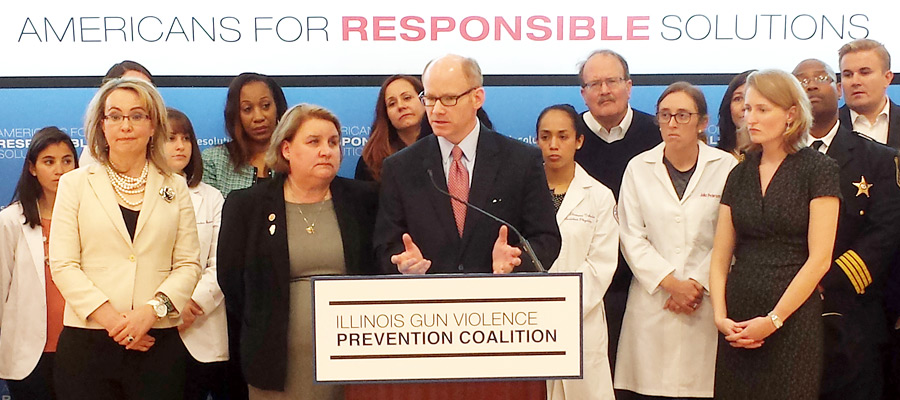- Details
- Category: News
 Senator Don Harmon (D-Oak Park) released the following statement today regarding his vote on Senate Bill 231, a school funding reform measure that passed in the Illinois Senate on a vote of 31-21.
Senator Don Harmon (D-Oak Park) released the following statement today regarding his vote on Senate Bill 231, a school funding reform measure that passed in the Illinois Senate on a vote of 31-21.
“Today in Illinois we have a flawed school funding formula that distributes state aid unfairly. It’s a system that’s been in place for nearly 20 years and no longer works for everyone.
“Illinois needs to distribute the resources it has more fairly across the state by giving more consideration to factors that increase the cost of educating youth, such as student poverty and the number of bilingual students in a school.
“This was not an easy vote for me because of the different needs of schools across our district. But after carefully looking at the numbers and weighing the benefits, I determined it was important to vote in favor of overhauling a flawed system and acknowledging that additional resources need to be directed to the schools and the students that need them the most throughout our district and Illinois.
“I don’t believe Senate Bill 231 will become law in its current form. But we’ve debated school funding reform for years, and we’ve always found a way to collectively say no. It’s time to start saying yes.
“This step today is a part of that conversation, not the final word. We need to find a way, consistent with the best evidence available, to direct new resources where they are needed the most. We must also strive to do so in a way that doesn’t divert resources away from districts that can’t make do without them.
“We need to ensure educational excellence across the state. We can do that only by appropriating adequate resources and distributing them fairly.
“Senate Bill 231 moves the discussion forward. I feel that this proposal, when paired with the appropriate level of state funding for schools, could work for everyone. I look forward to being part of a continued conversation about great public schools and fair funding in this state.”
- Details
- Category: News
Illinois colleges and universities would receive additional money to help them keep their doors open during the state’s prolonged budget stalemate under a measure Senator Don Harmon (D-Oak Park) voted for on Thursday.
Senate Bill 2048 would provide an additional $453 million for eight public Illinois universities and an additional $46 million for Monetary Award Program grants for students and funding for community colleges.
Combined with funding that was approved for higher education in April, the appropriation would represent about 60 percent of the money promised for these universities and colleges for Fiscal Year 2016.
“Although it’s an easy decision for me to vote to send more money to colleges and universities, our job in the General Assembly is not finished,” Harmon said. “This appropriation still falls short of what we’ve promised to our institutions of higher learning and to students who count on state tuition assistance to be able to afford college.”
- Details
- Category: News
 Communities in rural Illinois would face one less obstacle in acquiring broadband internet access under a measure that Senator Don Harmon (D-Oak Park) advanced Wednesday in the General Assembly.
Communities in rural Illinois would face one less obstacle in acquiring broadband internet access under a measure that Senator Don Harmon (D-Oak Park) advanced Wednesday in the General Assembly.
Senate Bill 2237, which passed in the Senate and now goes to the House for consideration, would allow broadband internet providers to use existing highway right-of-ways for laying fiber optic cable.
These are the same right-of-ways that water and sewer utilities use for laying pipe. The property is not productive farmland, suitable for building or used for any purpose other than roadways, nor is it subjected to property taxes.
Currently, individuals who own the land under these highways can choose to delay fiber optic projects indefinitely by refusing to grant access to the broadband providers.
Read more: Harmon advances measure to help bring broadband internet to rural Illinois
- Details
- Category: Showcase
 CHICAGO — Illinois State Senator Don Harmon (D-Oak Park) and former Arizona Congresswoman Gabrielle Giffords on Thursday called for greater accountability from Illinois gun dealers in an effort to curb violent crime with illegally purchased guns in Chicago and elsewhere in the state.
CHICAGO — Illinois State Senator Don Harmon (D-Oak Park) and former Arizona Congresswoman Gabrielle Giffords on Thursday called for greater accountability from Illinois gun dealers in an effort to curb violent crime with illegally purchased guns in Chicago and elsewhere in the state.
Harmon is the Senate sponsor of legislation that would give state authorities and police agencies the tools they need to encourage better business practices by federally licensed gun dealers, while holding corrupt gun dealers accountable.
During a news conference in Chicago announcing the formation of a new statewide effort known as the Illinois Gun Violence Prevention Coalition, Harmon noted that licensed gun dealers are an important link between gun manufacturers and the public. While most Illinois gun dealers strive to be responsible and do the right thing, he said, other dealers are negligent and engage in practices that fuel illegal gun trafficking.
“Yes, many guns are being trafficked into our communities from outside of the state. But consider this: 40 percent of guns used in crimes in Chicago between 2009 and 2014 came from Illinois,” Harmon said. “And the state of Illinois doesn’t have the tools and authority it needs to combat illegal or negligent business practices that threaten Illinois families.”
The legislation, which is expected to be filed in the Legislature next week, would make the following changes to Illinois law:
— Require criminal background checks for gun dealer employees, who have access to large inventories of guns.
— Require training and education for gun dealer employees so the background check system can work better. Employees need to know how to conduct background checks, identify and stop straw purchases of firearms, and properly store guns to prevent thefts.
— Demand additional accountability from gun dealers by enabling state and law enforcement officials to inspect inventories of licensed gun dealers for missing firearms.
“This type of effort is long overdue in Illinois. We’ve been working on these issues for a long time, and we’ve learned a lot,” Harmon said.
“But the obvious fact to me is that often between a gun manufacturer and a crime scene is someone reporting to be a law-abiding gun owner who is not. This legislation is a commonsense response to a gun violence epidemic that is destroying families and communities.”
Giffords, who survived a 2011 assassination attempt during a meet-and-greet event with constituents in Tucson, and her husband, retired astronaut Mark Kelly, co-founded Americans for Responsible Solutions, which advocates for commonsense solutions to gun violence in America. Giffords and Kelly are gun owners.
During an appearance in Chicago Thursday with Harmon and gun violence prevention advocates, Giffords encouraged Illinois to fight for sensible change.
“Now is the time to come together, be responsible – Democrats, Republicans, everyone,” she said. “We must never stop fighting. Fight, fight, fight. Be bold. Be courageous. The nation’s counting on you.”
Illinois Representative Kathleen Willis (D-Northlake) is sponsoring the legislation in the House.
- Details
- Category: News
Senator Don Harmon (D-Oak Park) explains the Fair Tax initiative that's pending in the Illinois Legislature and why he has long supported shifting to a fair tax in a new video.
The proposal would allow Illinois to shelve its archaic flat income tax structure, which is enshrined in the state constitution, and replace it with a fair tax in which lower rates would apply to lower incomes and higher rates would apply to higher incomes.
"I've supported the fair tax for years because I'm convinced it's the only way we get out of this hole we're in in Illinois," Harmon said. "We have no nimbleness in our tax policy. We are very reluctant to raise income taxes because we know how much it hurts working families.
"If we don't have the flexilbity to apply lower rates to lower income levels and higher rates to higher income levels, we'll never dig out of this without raising income tax rates on everybody in the state."




